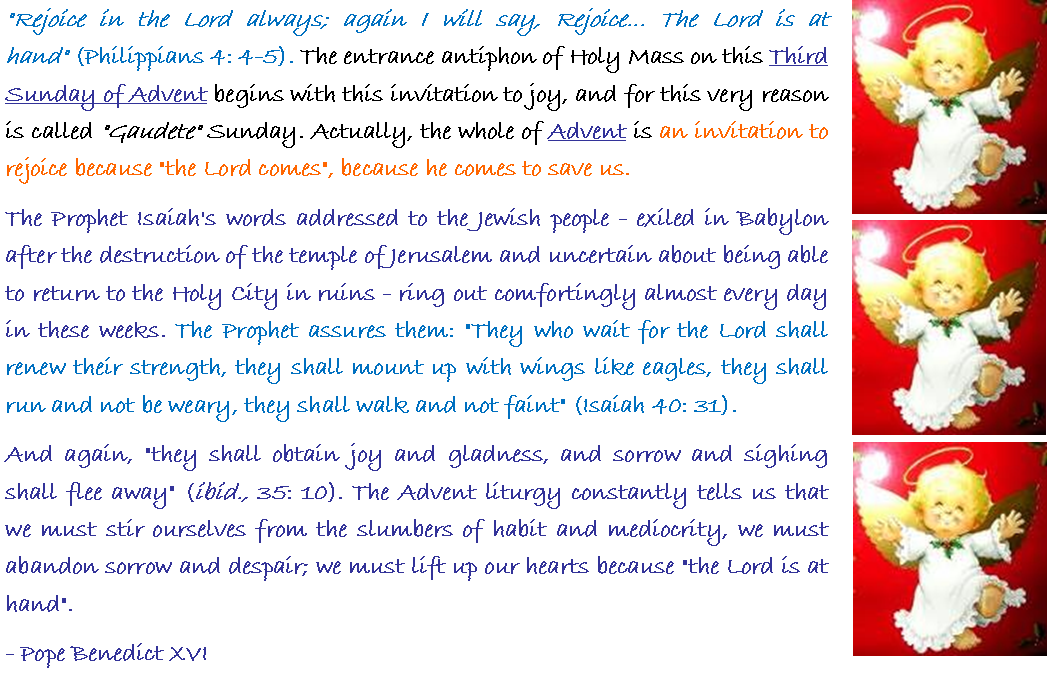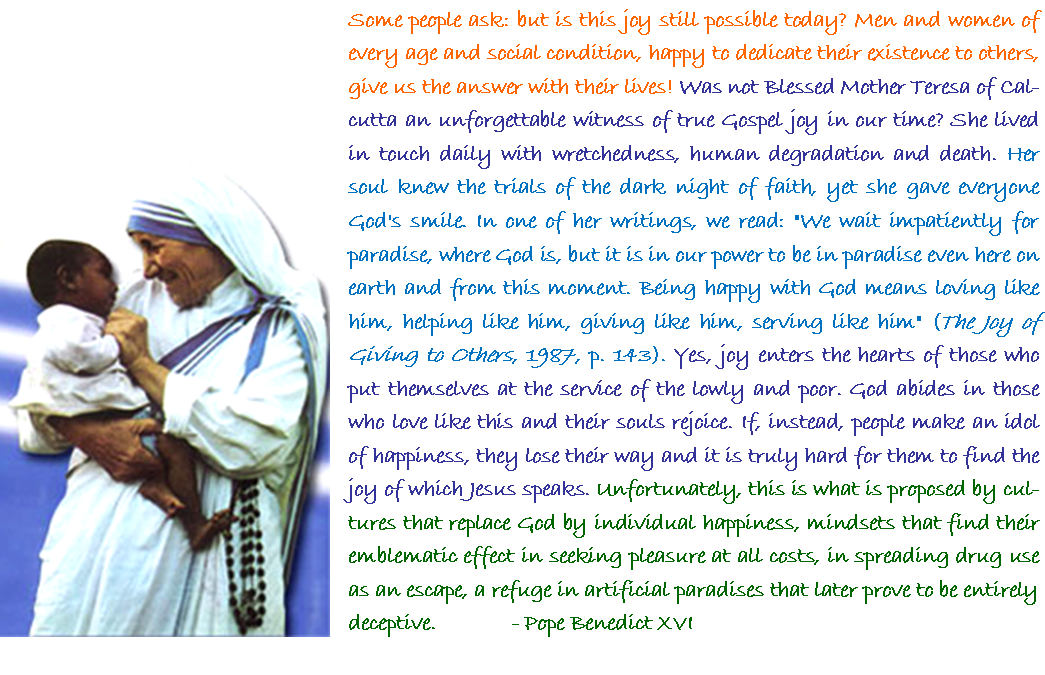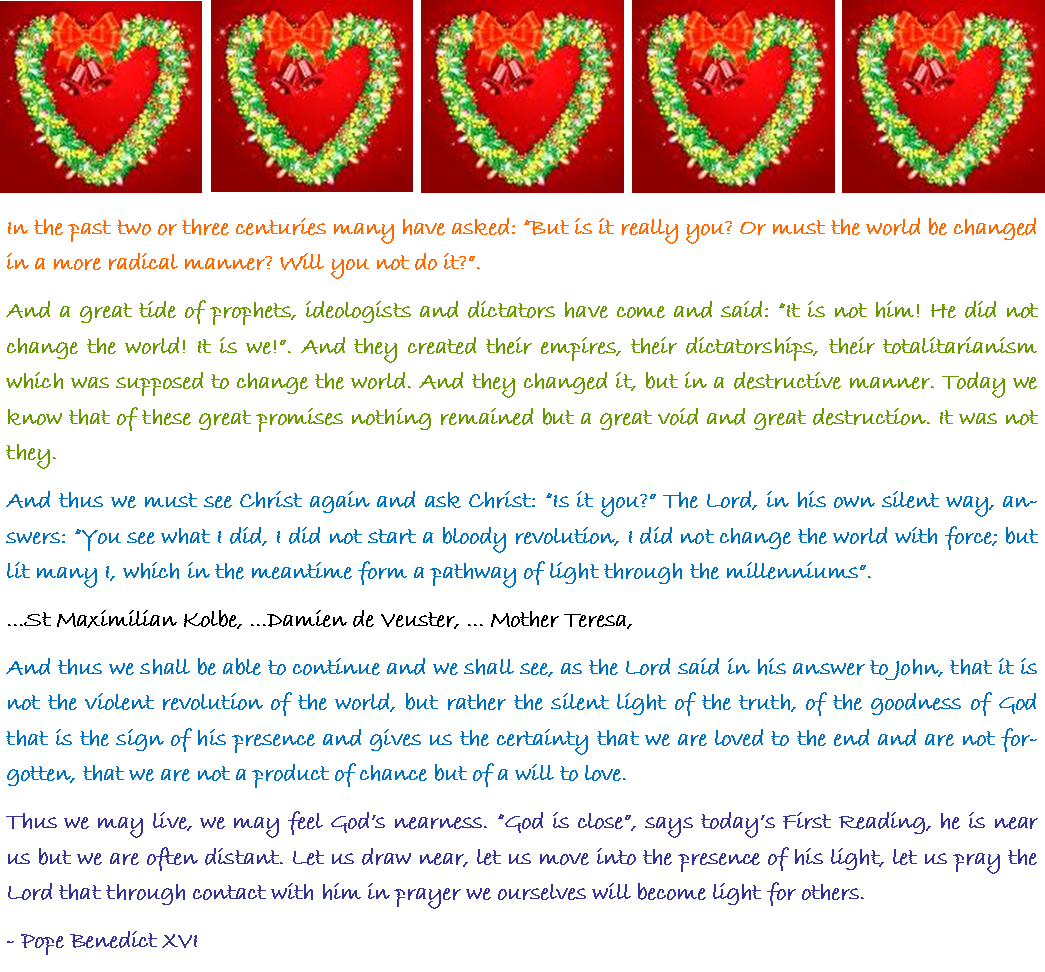|
100 |

|
I would then like to greet with affection Bishop Benedetto Tuzia, Auxiliary of the Western Sector, and your parish priest, Fr Gerard Charles McCarthy, whom I thank for his warm words to me at the beginning of our solemn celebration. I greet his collaborators, the priests who belong to the Priestly Brotherhood of the Missionaries of St Charles Borromeo, to whom the pastoral care of this parish was entrusted in 1997 and who are represented here by Mons. Massimo Camisasca, Superior General. I greet the Sisters Oblates of Divine Love and the Missionaries of St Charles who work with dedication in this community, and all the groups of children, young people, families and the elderly who enliven life in the parish. I also extend a cordial greeting to the various ecclesial movements present here, including Ardent Marian Youth, Communion and Liberation, Catholic Charismatic Renewal, the Brotherhood of St Mary of the Angels and the Little St Therese Volunteers Group. Furthermore, I am eager to encourage all those who, together with the parish Caritas, seek to meet the many needs in the neighbourhood, especially by responding to the expectations of the poorest and neediest. Lastly, I greet the Authorities present and the personages who have desired to take part in our liturgical assembly. Dear friends, today we are experiencing a day that crowns everyone's efforts, labour and sacrifices and the community's commitment to building itself up to be a mature Christian community, anxious to have a place reserved definitively for the worship of God. The special wealth of words and symbols of today's celebration helps us to understand the profound value of what we are doing. Let us, therefore, briefly consider the teaching that comes to us from the Readings just proclaimed.
The First Reading is taken from the Book of Nehemiah, a book that tells of the reconstitution of the Jewish community after the Exile, the dispersion and the destruction of Jerusalem. Thus, it is the Book about the new origins of a community and is full of hope, even through great difficulties still loomed ahead. Two great figures stand out in the heart of the passage which has just been read: a priest, Ezra, and a lay man, Nehemiah, respectively the religious and civil Authorities of that time.
Does not this Old Testament Reading also inspire deep emotion in us? How many memories flood your minds at this moment! How much effort in building the community year after year! How many dreams, how many projects, how many difficulties! Now, however, we are given the opportunity to proclaim and listen to God's Word in a beautiful church, which is conducive to recollection and inspires joy; the joy of knowing that not only the Word of God is present, but the Lord himself: a church which desires to be a constant reference to unwavering faith and to the commitment to developing as a united community. Let us thank God for his gifts and thank all who have served as artisans in this church's construction and of the living community gathered in it. In the Second Reading from the Book of Revelation, a marvellous vision is recounted for us. God's project for his Church and for all humanity is a holy city, Jerusalem, coming down from Heaven, gleaming with divine glory. The author describes this marvellous city, comparing it with the most precious gems, and finally explains that it is founded on the person and message of the Apostles. By saying this, the Evangelist John suggests to us that the living community is the true, new Jerusalem, and that the living community is more sacred than the material temple which we are dedicating. And to build this living temple, this new city of God in our cities, to build this temple - which you are -, much prayer is needed and it is necessary to make the most of every opportunity offered by the liturgy, catechesis and the numerous pastoral, charitable, missionary and cultural activities which keep your promising parish "youthful". May the care we show for the material building - sprinkling it with holy water, anointing it with oil, incensing it - be a sign and an encouragement for intensifying our care in defending and promoting the temple of people, formed by you, dear parishioners.
Lastly, the Gospel passage we heard tells of a conversation between Jesus and his followers, and in particular with Peter; a conversation wholly focused on the Person of the divine Teacher. The people had sensed something about him; some believed he was John the Baptist brought back to life, others said he was Elijah returned to the earth, still others, the Prophet Jeremiah, in every case placing him in the category of great religious figures. Instead, Peter, speaking on behalf of the disciples who knew Jesus well, declares that Jesus is far more than a prophet or a great historical religious person: he is the Messiah - he is Christ the Son of the living God. And Christ the Lord says to him solemnly: you are Peter and on this rock I will build my Church. Peter, the poor man with all his weaknesses and with his faith, becomes the rock associated, precisely because of his faith, with Jesus; he is the rock on which the Church was founded. Thus, once again, we see that Jesus Christ is the true steadfast rock on which our faith stands, on which the whole Church - hence, also this parish - is built. And we meet Jesus in listening to the Sacred Scriptures. He is present and makes himself our food in the Eucharist, he dwells in the community, in the faith of the parish community. Everything, therefore, in the church building and in the Church community speaks of Jesus, everything is related to him, everything refers to him. And the Lord Jesus gathers us in the great community of the Church of all times and all places, in close communion with the Successor of Peter as a rock of unity. The action of the Bishops and priests, the apostolic and missionary commitment of every member of the faithful, is to proclaim and to witness with his or her words and life that he, the Son of God made man, is our one Saviour.
Let us ask Jesus to guide your community and make it ever more faithful to his Gospel; let us ask him to inspire many holy priestly, religious and missionary vocations; to make all parishioners willing to follow the example of the holy Portuensi Martyrs. Let us entrust our prayers to the motherly hands of Mary, Queen of the Rosary. May she obtain that the last words of the First Reading come true for us today: "the joy of the Lord is our strength" (cf. Nehemiah 8: 10). Only the joy of the Lord and the power of faith in him can make your parish's progress fruitful. And thus may it be! |

|
BENEDICT XVI ANGELUS St Peter's Square
Dear Brothers and Sisters,
"Gaudete in Domino semper - Rejoice in the Lord always (Philippians 4: 4). Holy Mass of the Third Sunday of Advent opens with these words of St Paul and is therefore called "gaudete" Sunday. The Apostle urges Christians to rejoice because the Lord's coming, that is, his glorious return, is certain and will not be delayed. The Church makes this invitation her own while she prepares to celebrate Christmas and her gaze is focused ever more intently on Bethlehem. Indeed, we wait with hope, certain of Christ's second coming because we have experienced his first. The mystery of Bethlehem reveals to us God-with-us, the God close to us and not merely in the spatial and temporal sense; he is close to us because he has, as it were, "espoused" our humanity; he has taken our condition upon himself, choosing to be like us in all things save sin in order to make us become like him. Christian joy thus springs from this certainty: God is close, he is with me, he is with us, in joy and in sorrow, in sickness and in health, as a friend and faithful spouse. And this joy endures, even in trials, in suffering itself. It does not remain only on the surface; it dwells in the depths of the person who entrusts himself to God and trusts in him.
Some people ask: but is this joy still possible today? Men and women of every age and social condition, happy to dedicate their existence to others, give us the answer with their lives! Was not Blessed Mother Teresa of Calcutta an unforgettable witness of true Gospel joy in our time? She lived in touch daily with wretchedness, human degradation and death. Her soul knew the trials of the dark night of faith, yet she gave everyone God's smile. In one of her writings, we read: "We wait impatiently for paradise, where God is, but it is in our power to be in paradise even here on earth and from this moment. Being happy with God means loving like him, helping like him, giving like him, serving like him" (The Joy of Giving to Others, 1987, p. 143). Yes, joy enters the hearts of those who put themselves at the service of the lowly and poor. God abides in those who love like this and their souls rejoice. If, instead, people make an idol of happiness, they lose their way and it is truly hard for them to find the joy of which Jesus speaks. Unfortunately, this is what is proposed by cultures that replace God by individual happiness, mindsets that find their emblematic effect in seeking pleasure at all costs, in spreading drug use as an escape, a refuge in artificial paradises that later prove to be entirely deceptive.
Dear brothers and sisters, one can lose the way even at Christmas, one can exchange the true celebration for one that does not open the heart to Christ's joy. May the Virgin Mary help all Christians and people in search of God to reach Bethlehem, to encounter the Child who was born for us, for salvation and for the happiness of all humanity.
After the Angelus:
I would like to greet the children and young people of Rome who have come here in large numbers this year in spite of the cold to receive the blessing of the Christ Child figurines for their cribs. Dear friends, with great affection I wish you and your relatives a good Christmas. And as I thank the Centro Oratori Romani which organizes this beautiful initiative, I urge priests, parents and catechists to collaborate enthusiastically in the Christian education of children. Thanks to you all and a good Sunday! |

|
PASTORAL VISIT TO THE PARISH HOMILY OF HIS HOLINESS BENEDICT XVI Third Sunday of Advent, 12 December 2010
Dear Brothers and Sisters of the Parish of San Massimiliano Kolbe,
You are deeply living your personal and community commitment to follow the Lord. Advent is a strong invitation to everyone to let God come increasingly into our lives, our houses, our neighbourhoods and our communities in order to have light in the midst of the many shadows, in the numerous daily efforts.
Dear friends, I am very glad to be with you today to celebrate the Lord’s Day, the Third Sunday of Advent, the Sunday of joy.
I cordially greet the Cardinal Vicar, the Auxiliary Bishop of the Sector, your Parish Priest, whom I thank for his words on behalf of you all, and the Parochial Vicar.
I greet all those who are active in the parish context: the catechists and the members of various groups including the Neocatechumenal Way. I deeply appreciate your decision to make room for Eucharistic adoration and I thank you for the prayers you say for me before the Most Blessed Sacrament.
I would like to extend my thoughts to all the inhabitants of the district, especially the elderly, the sick and those who are alone or in difficulty. I remember each and every one at this Mass. I join you in admiring your new church and the parish buildings, and I wish to encourage you by my presence to bring ever better into being that Church of living stones which you yourselves are.
I know of the many important evangelization projects that you are carrying out. I urge all the faithful to make their own contribution to the edification of the community, in particular in the field of catechesis, the liturgy and charity — pillars of Christian life — in communion with the whole Diocese of Rome. No community can live as a cell isolated from the diocesan context; instead the community must be a living expression of the beauty of the Church which, under the guidance of the Bishop — and in the parish, under the guidance of the Parish Priest who acts in his place — journeys on in communion towards the Kingdom of God.
I address a special thought to families, accompanying them with the wish that they may totally fulfil their vocation to love, and with generosity and perseverance. Even when difficulties arise in conjugal life and in the relationship with their children, married couples must never cease to stay faithful to that fundamental “yes” which they said before God and to each other on their wedding day, remembering that faithfulness to one’s vocation demands courage, generosity and sacrifice.
Your community includes many families from Central and Southern Italy who have come in search of work and better standards of living. As time has passed the community has grown and has changed, to a certain extent, with the arrival of many people from the Eastern European countries and from many other countries.
On the basis of this practical situation in the parish, make an effort to grow constantly in communion with all: it is important to create opportunities for dialogue and to foster understanding among people from different cultures, backgrounds and social conditions.
Yet, above all, it is necessary to try to involve them in Christian life, through a pastoral care attentive to the true needs of each person. Here, as in every parish, it is necessary to start with those who are “close” in order to reach out to those who are “distant” so as to bring an evangelical presence to the milieus of life and work.
All must be able to find in the parish an adequate means of formation and must be able to experience that community dimension which is a fundamental characteristic of Christian life. In this way they will be encouraged to rediscover the beauty of following Christ and of belonging to his Church.
Continue next page ...
22 December 2013 |